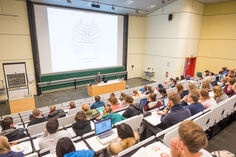- Admission requirements
- Registration
- Structured study program
- Writing the dissertation
- Submission of the dissertation
- Evaluation procedure
- Oral examination (Rigorosum)
- Certificate & use of the doctoral degree
- Doctoral ceremony & award
- Dates and deadlines
- Downloads
- FAQ
- Doctoral Committee
- Information for supervisors and reviewers
Doctoral study program
In addition to the research activities of the doctoral thesis, the study program is designed to provide structured graduate education with theoretical and practical learning content. This includes scientific teaching content as well as the training of soft skills and core competencies. The study program is agreed upon in the doctoral agreement between the supervisor and the doctoral student. According to § 5, the study program must be submitted upon acceptance for doctoral studies and must be approved by the doctoral committee. As a rule, the scope of the study program should total 240 hours. Compulsory courses include
- a so-called Thesis Advisory Committee (TAC) elected in consultation with the supervisor and consisting of at least three members who are usually habilitated, but at least have a doctorate and are independent of each other (for more information see below). The TAC usually meets for the first time within the first six months after the start of the doctoral thesis, then at mid-term and before the doctoral thesis is written (in the first, second and third year of the doctorate). One week before each TAC meeting, the doctoral student submits an update report to the TAC on the progress of his/her doctoral project. A short protokol must be taken of each TAC meeting.
- Courses on Good Scientific Practice (see seminar program of the Graduate Academy - Heidelberg University (uni-heidelberg.de)). In addition to the seminar "Good Scientific Practice", the course "Research Integrity" will also be recognized if all modules have been successfully completed (6.5 hours in total).
- Literature and research seminars of at least 1-2 semester hours each
Elective compulsory courses (at least one of the following three courses):
- Methods practicals and seminars,
- Laboratory practicals,
- Participation in professional congresses or doctoral congresses of the faculty for the presentation of own work.
The study program also includes lecture series of scientific institutions representing respective doctoral fields, training in key competencies and soft skills.
A so-called bluesheet as well as individual proofs of successful participation in the above-mentioned courses and events must be submitted to the doctoral office when submitting the dissertation.
For accredited structured study programs (PhD programs at DKFZ, IZN and HIDSS4Health upon presentation of evidence of participation in Journal clubs), proof of participation in the study program must be submitted. Independently of the program, after each TAC meeting, the TAC progress reports and completed TAC evaluation forms have to be submitted to the Office for Doctoral Affairs (med.promotion@med.uni-heidelberg.de). Please note that only the TAC sessions that take place after acceptance as a doctoral candidate by the doctoral committee can be considered for the study program.
The successful participation at the doctoral program will be documented in the doctoral certificate.
FURTHER INFORMATION ABOUT THE STUDY PROGRAM:
Thesis Advisory Committee (TAC)
- Each TAC consists of the doctoral supervisor and at least two other independent members. These do not come from the same department or research group, but have expertise in scientific topics related to the research topic. In implementation, this means that in addition to the official doctoral supervisor, another TAC member may come from the same institute / clinic. However, he/she is not allowed to belong to the same department and should be independent from the official supervisor. The third TAC member must be external to your institute / clinic.
- TAC members are usually habilitated university teachers, but can also be scientists with several years of experience after their doctorate (e.g. junior research group leaders). Two out of three TAC members should be habilitated (PD, apl. Prof., Prof.).
- Your co-supervisor can be an additional (4th) TAC member.
- Original signatures of TAC members are not required. Electronic signatures / scans are sufficient.
The current doctoral regulations can be found in the Rector's newsletter.
- Admission requirements
- Registration
- Structured study program
- Writing the dissertation
- Submission of the dissertation
- Evaluation procedure
- Oral examination (Rigorosum)
- Certificate & use of the doctoral degree
- Doctoral ceremony & award
- Dates and deadlines
- Downloads
- FAQ
- Doctoral Committee
- Information for supervisors and reviewers



![[Translate to English:] [Translate to English:]](/fileadmin/_processed_/9/b/csm_Firefly_Abstract_organic_flow_resembling_blood_vessels_shaped_as_a_tool__composed_of_glowing_651800_26778ea790.png)
